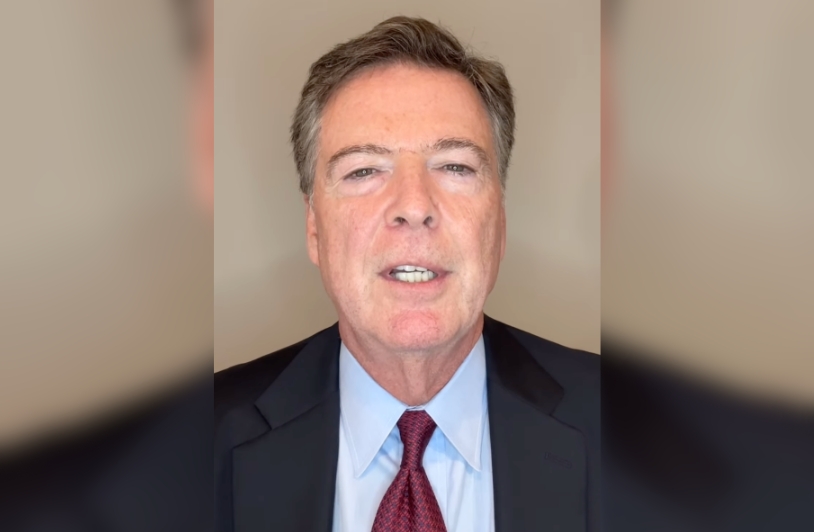The central issue with the White House-ordered indictment of James B. Comey Jr. obviously isn’t about the fate of Comey, but about Donald Trump and the Justice Department officials he uses as avatars on a gameboard.
If anything, the belated, if strangely hazy indictment by a Virginia grand jury after U.S. Attorney Erik Siebert said there was insufficient evidence for a federal case is proof both that none of us is safe from a twisted use of prosecution machinery and that Trump once again has stepped into impeachable abuse of office.
The indictment effort resuscitated by newly installed interim U.S. Attorney Lindsey Halligan, who signed the charging documents in place of career prosecutors within a day, just before the statute ran out, alleges lying to Congress on one appearance five years ago. How difficult is it to imagine that the first witness the defense will call will be Siebert to testify that there was insufficient evidence to prove lying beyond a reasonable doubt?
Comey’s behavior is less the point than that of Trump in thinking it legal, constitutional, and reasonable for him to use the power of the presidency to name and target individual political opponents — putting the Trump era into an untethered dictatorial state.
Along with thinking himself knower of all things medical, financial, educational and environmental, Trump insists on using the White House perch to settle personal grievances and prejudge Comey’s guilt. Trump feels safe in a Supreme Court-issued immunity decision that protects against most crimes, as well as from being voted out or impeached by a feckless Congress.
The Case Against Comey
The sparse two-count indictment does not deal the real issues Trump has with Comey — Comey’s outspoken opposition, his refusal to let former National Security Adviser Michael Flynn skate on illegal behavior, and his role in creating the investigation of Trump campaign cooperation with Russian operatives before the 2016 election. Rather, the indictment lists two charges of making a false statement and obstructing a congressional proceeding with no explanation.
The underlying case is about Comey lying to the Senate Judiciary Committee when he said he had not authorized anyone else at the FBI to be an anonymous source in news reports about an unnamed investigation. That seems to refer to an FBI inquiry related to former Secretary of State Hillary Clinton, who ran for president against Trump in 2016 and lost. The indictment alleges that Comey “corruptly endeavor(ed) to influence, obstruct and impede the due and proper exercise” of the Senate’s inquiry.
That’s it. Whatever else, it was a reminder that the feds charged Al Capone with income tax counts, not the charges they really wanted.
Following those principles, much of the Trump Cabinet and many other appointees should go face grand juries. Robert F. Kennedy Jr. testified at his confirmation hearing that he would leave vaccines in place, but has not, an apparent lie to the Senate. Attorney General Pam Bondi and her principal deputies vowed not to run politicized investigations and prosecutions, obviously now open lies. In his confirmation as to a lifetime appeals court judgeship, Emil Bove publicly lied about witnessed advice he gave to prosecutors to snub court rulings about immigration to speed deportations.
FBI Director Kash Patel, Defense Secretary Pete Hegseth, and others have routinely skirted direct questions from the Senate, “obstruct and impeding” Senate inquiry in everything from release of embarrassing Jeffrey Epstein material to public sharing of live war information on Signal internal management.
If public lying is now a criminal matter, Trump himself, who has been convicted of 34 fraud counts as well as multiple civil judgments, perhaps should be a witness to the significance of the crime.
Now Prove It
As pundits across political persuasions could agree, the Comey indictment represents a sea change in use of the presidency to harry, punish and humiliate a political enemy at the expense of procedural safeguards intended to shield the Justice Department from political interference and personal vendettas.
View this post on Instagram
And we’re paying for it in direct cost, in loss of career prosecutors, and in redirecting Justice Department efforts towards the unnecessary.
Obviously, we will find out in months if there is evidence to convict. If the charges were brought with knowable insufficient evidence, the Justice Department could face court sanctions that will never reach Donald Trump.
Both Trump and his critics agree that Trump is running the Justice Department as a personal fiefdom and using threats of investigation and prosecution against a list of perceived political enemies that grows by the day. But there is massive disagreement that this is a good thing. What critics see as Trump interference and “weaponization,” Trump’s White House sees as “accountability” for previous weaponization — justifying personal involvement in directing Justice to strike against named individuals.
This week, that list of threats included fund-raisers for Democrats as Trump seeks to tie them into the financing of what he sees as single-directional political violence from the “radical left.” That group now includes such leftists as former National Security Adviser John Bolton and other Trump appointees who turned against him.
Trump acts as if his opinions and personal animosities conflate with criminal behavior. On its face, that is delusional. But he also acts as if his close popular election was a mandate to overturn legal ethics and put himself in the simultaneous roles of accuser, judge and jury. That is abuse of power and impeachable.
CLICK TO DONATE IN SUPPORT OF DEMOCRACY AND OUR NONPROFIT NEWSROOM




